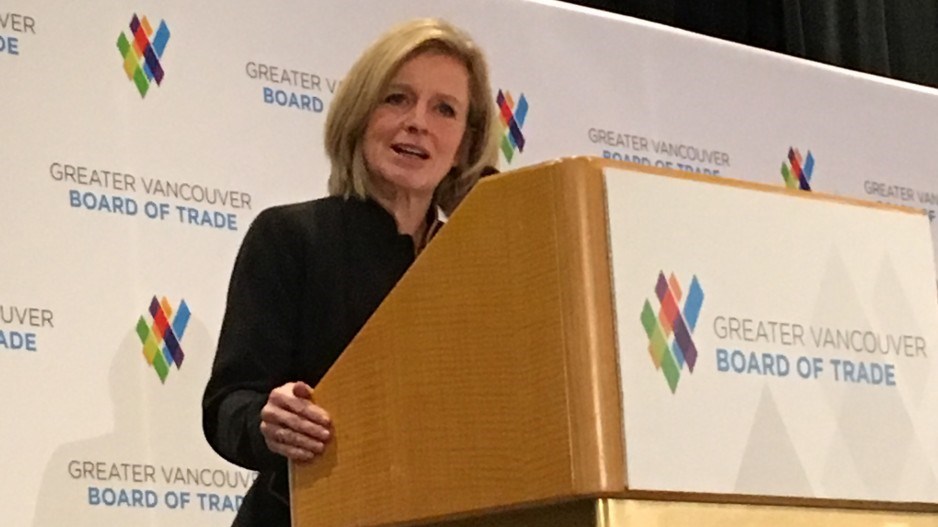Alberta Premier Rachel Notley addressed Albertans through her Lieutenant Governor in a speech from the Throne Thursday, March 8, but her message was aimed squarely at British Columbia.
Any more funny stuff from the B.C. government that threatens the movement of Alberta oil, and Notley vowed she will follow the lead of former Alberta Premier Lougheed, who reduced oil production in Alberta as a way to punish Eastern Canada for its National Energy Program.
Although a temporary truce exists in a trade war between Alberta and B.C. over the $7.5 billion Trans Mountain expansion project, Notley made it clear in the Throne speech that if the B.C. government continues to try to exceed its constitutional limits to prevent the expansion of the Trans Mountain pipeline, she will not hesitate to pull out the big guns.
Although some gasoline and jet fuel comes from Washington State refineries, much of the gasoline and diesel used in B.C. comes from Alberta, either directly as refined fuels through the Trans Mountain pipeline, or as crude, which is refined in Burnaby.
Jason Kenney, leader of Alberta’s United Conservative Party, has said that, if he is elected premier in the next Alberta election, he would stop permits that allows Alberta oil to flow to B.C.
Through her lieutenant governor, Notley warned her government is also prepared to restrict the flow of oil and-or refined fuel to B.C.
“Some people have asked how far we are willing to go,” said Alberta Lt.-Gov. Lois Mitchell. “Today, we reaffirm we will do whatever it takes.
“In the past, when workers in our energy industry were attacked and when the resources we own were threatened, Premier Peter Lougheed took bold action.
“Your government has been clear: Every option is on the table. We will not hesitate to invoke similar legislation if it becomes necessary owing to extreme and illegal actions on the part of the B.C. government to stop the pipeline.
“Make no mistake, Alberta has no desire to take this step, but it is important that B.C. and the country know that we will do whatever it takes to make sure our constitutional rights are respected as partners in Confederation.”
A trade war briefly erupted earlier this year, when Notley ordered a boycott of all B.C. wines – a move calculated to cost B.C. wineries $70 million annually.
That boycott was in response to threats by B.C.’s NDP government to limit volumes of diluted bitumen flowing from Alberta through B.C. by rail or pipeline. Those limits were part of the B.C. government’s five-point plan to deal with the potential risks of oil spills.
Premier John Horgan backed off somewhat when he announced February 22 that the most contentious point – restricting bitumen volumes to current levels – would be held in abeyance until his government can get a ruling from the courts on whether or not B.C. has the constitutional authority to enact such restrictions.
Notley immediately responded by suspending Alberta’s boycott of B.C. wine.
Notley is facing re-election in 2019, and her province is still recovering from a severe downturn in its oil industry, as a result of plummeting oil prices in 2014. She is therefore under pressure from Albertans to make good on a promise to get pipelines built. A critical part of that effort was enacting new carbon taxes and other climate change policies – something intended to mitigate the emissions from Alberta's oil sands and get social buy-in.
A lack of pipeline access is costing Canada $15 billion a year, a recent Scotiabank Economics study estimated. Much of that loss is in Alberta. It is hoped that twinning the Trans Mountain pipeline will increase the value of Alberta oil by increasing its access to other markets, including Asia and California.




